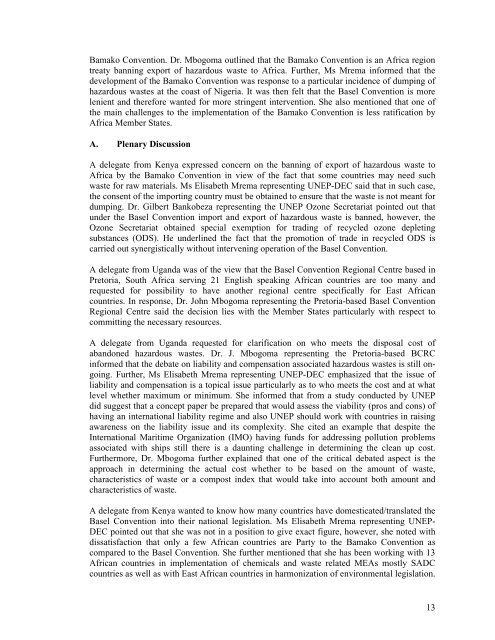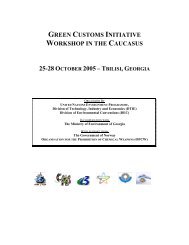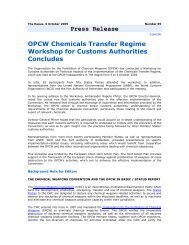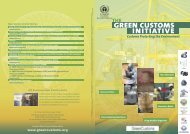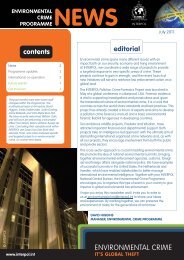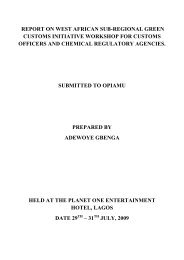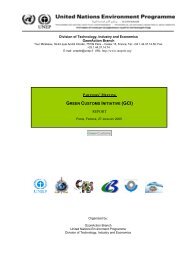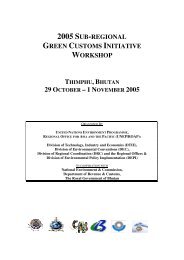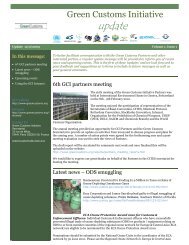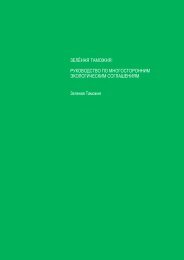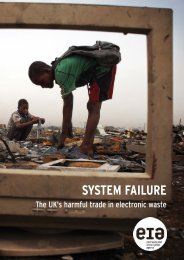Arusha - Green Customs Initiative
Arusha - Green Customs Initiative
Arusha - Green Customs Initiative
You also want an ePaper? Increase the reach of your titles
YUMPU automatically turns print PDFs into web optimized ePapers that Google loves.
Bamako Convention. Dr. Mbogoma outlined that the Bamako Convention is an Africa region<br />
treaty banning export of hazardous waste to Africa. Further, Ms Mrema informed that the<br />
development of the Bamako Convention was response to a particular incidence of dumping of<br />
hazardous wastes at the coast of Nigeria. It was then felt that the Basel Convention is more<br />
lenient and therefore wanted for more stringent intervention. She also mentioned that one of<br />
the main challenges to the implementation of the Bamako Convention is less ratification by<br />
Africa Member States.<br />
A. Plenary Discussion<br />
A delegate from Kenya expressed concern on the banning of export of hazardous waste to<br />
Africa by the Bamako Convention in view of the fact that some countries may need such<br />
waste for raw materials. Ms Elisabeth Mrema representing UNEP-DEC said that in such case,<br />
the consent of the importing country must be obtained to ensure that the waste is not meant for<br />
dumping. Dr. Gilbert Bankobeza representing the UNEP Ozone Secretariat pointed out that<br />
under the Basel Convention import and export of hazardous waste is banned, however, the<br />
Ozone Secretariat obtained special exemption for trading of recycled ozone depleting<br />
substances (ODS). He underlined the fact that the promotion of trade in recycled ODS is<br />
carried out synergistically without intervening operation of the Basel Convention.<br />
A delegate from Uganda was of the view that the Basel Convention Regional Centre based in<br />
Pretoria, South Africa serving 21 English speaking African countries are too many and<br />
requested for possibility to have another regional centre specifically for East African<br />
countries. In response, Dr. John Mbogoma representing the Pretoria-based Basel Convention<br />
Regional Centre said the decision lies with the Member States particularly with respect to<br />
committing the necessary resources.<br />
A delegate from Uganda requested for clarification on who meets the disposal cost of<br />
abandoned hazardous wastes. Dr. J. Mbogoma representing the Pretoria-based BCRC<br />
informed that the debate on liability and compensation associated hazardous wastes is still ongoing.<br />
Further, Ms Elisabeth Mrema representing UNEP-DEC emphasized that the issue of<br />
liability and compensation is a topical issue particularly as to who meets the cost and at what<br />
level whether maximum or minimum. She informed that from a study conducted by UNEP<br />
did suggest that a concept paper be prepared that would assess the viability (pros and cons) of<br />
having an international liability regime and also UNEP should work with countries in raising<br />
awareness on the liability issue and its complexity. She cited an example that despite the<br />
International Maritime Organization (IMO) having funds for addressing pollution problems<br />
associated with ships still there is a daunting challenge in determining the clean up cost.<br />
Furthermore, Dr. Mbogoma further explained that one of the critical debated aspect is the<br />
approach in determining the actual cost whether to be based on the amount of waste,<br />
characteristics of waste or a compost index that would take into account both amount and<br />
characteristics of waste.<br />
A delegate from Kenya wanted to know how many countries have domesticated/translated the<br />
Basel Convention into their national legislation. Ms Elisabeth Mrema representing UNEP-<br />
DEC pointed out that she was not in a position to give exact figure, however, she noted with<br />
dissatisfaction that only a few African countries are Party to the Bamako Convention as<br />
compared to the Basel Convention. She further mentioned that she has been working with 13<br />
African countries in implementation of chemicals and waste related MEAs mostly SADC<br />
countries as well as with East African countries in harmonization of environmental legislation.<br />
13


